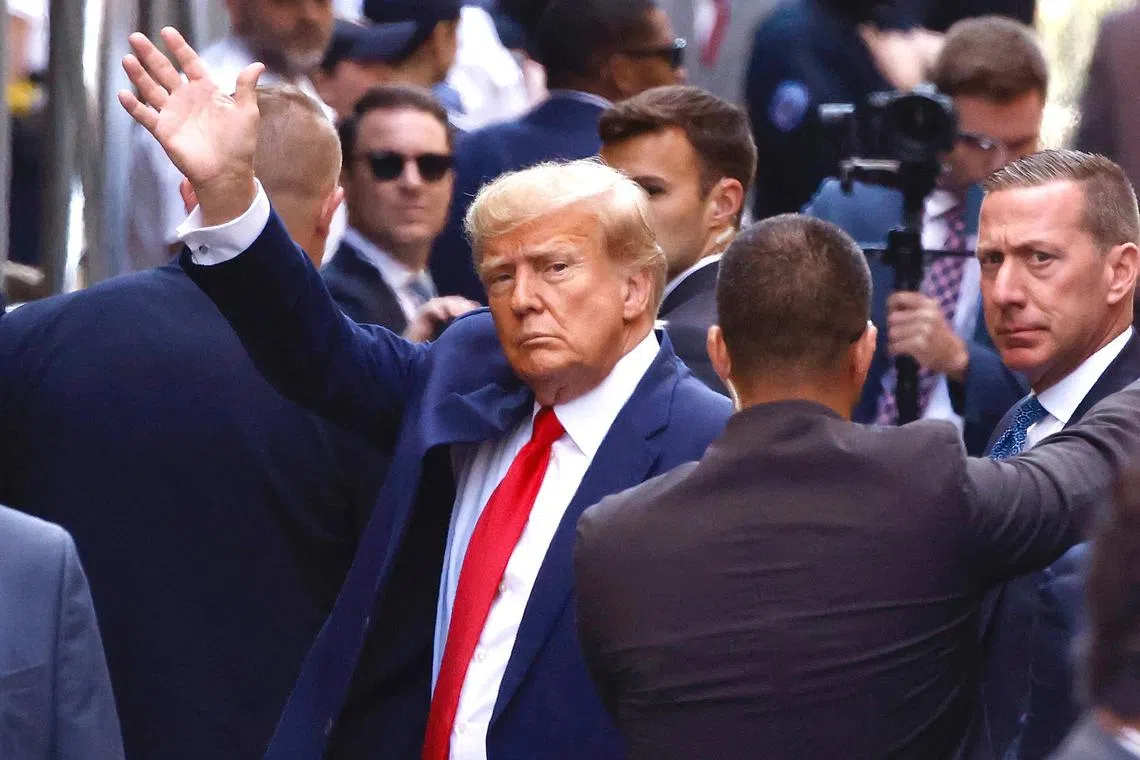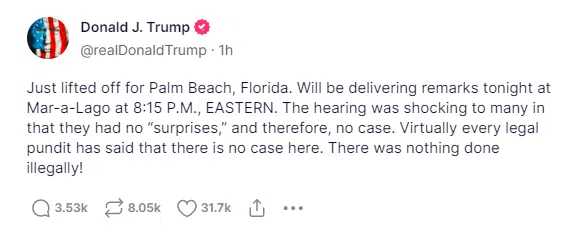What charges does Trump face in New York's hush money case?
Sign up now: Get ST's newsletters delivered to your inbox

Prosecutors charged Trump with 34 felony counts for falsifying business records related to a “catch and kill” scheme.
PHOTO: AFP
NEW YORK – The Manhattan District Attorney’s office on Tuesday unveiled charges against Donald Trump
Here is an explanation of the charges he faces and his possible defences.
What is Trump accused of doing?
Prosecutors led by Manhattan District Attorney Alvin Bragg 34 felony counts for falsifying business records
During the campaign, Trump’s former personal lawyer, Mr Michael Cohen, paid porn star Stormy Daniels $130,000 (S$172,000) for her silence
Trump denies the allegations and the affairs but has admitted to reimbursing Mr Cohen for his payment to Ms Daniels. He has called Mr Bragg’s probe a politically motivated “witch hunt” and pleaded not guilty during his first court appearance on Tuesday.
Taken together, the charges carry a maximum of 136 years in prison under New York law, but any prison sentence following a guilty verdict would almost certainly be far less than that.
Trump would almost certainly appeal any conviction.
What laws does that violate?
It is against New York state law to make a false entry in a company’s records. While falsification of business records on its own is a misdemeanour – it is punishable by a sentence of less than one year – it is considered a felony punishable by up to four years in prison if it is done to conceal or further other crimes.
In this case, Mr Bragg said that those other crimes include alleged election law violations.
Mr Cohen pleaded guilty in 2018 to federal charges of causing an unlawful campaign contribution and making an excessive campaign contribution tied to the scheme. The US Attorney’s office in Manhattan has not charged Trump, who it referred to in its charging document against Mr Cohen as “Individual-1”, with any crime.
What could Trump’s defence be?
Trump may argue that Mr Cohen acted on his own when paying Ms Daniels, whose real name is Stephanie Clifford. He may also argue that the purpose of silencing Ms Daniels
While Mr Cohen testified in 2018 that Trump directed him to pay Ms Daniels, Trump has repeatedly called Mr Cohen a “liar” and could attempt to undermine Mr Cohen’s credibility by pointing out that he has admitted to perjuring himself before Congress.
In an interview with Reuters in December 2018, Trump said the payment to Ms Daniels “wasn’t a campaign contribution” and “there was no violation based on what we did”.
Mr Joseph Tacopina, a lawyer for Trump, has argued in television interviews that Trump was a victim of extortion by Ms Daniels.
Trump has also said in a post on his Truth Social platform that the statute of limitations – generally five years in New York – has run out.

How could Mr Bragg overcome those arguments?
While Mr Cohen’s history of lies could provide fertile ground for Trump’s lawyers on cross-examination should he testify at an eventual trial, he has already been sentenced and served time.
That could blunt any attempt by Trump to argue that Mr Cohen is falsely implicating him to try to win a lenient sentence, a common argument criminal defendants make against cooperating witnesses.
Trump’s claim that Ms Daniels was extorting him may not be relevant to the case because the charge focuses on his company’s false accounting of the payments as legal expenses.
The statute of limitations is unlikely to be an issue, as it does not count time a defendant spends living outside New York state. Trump lived in Washington while he was president and has lived in Florida since leaving office in 2021. REUTERS


